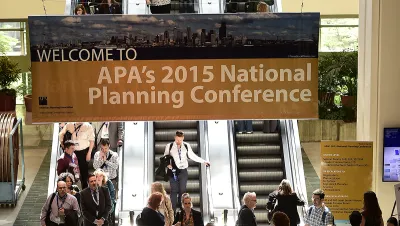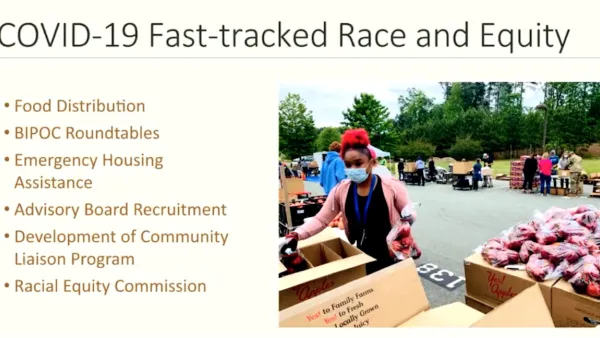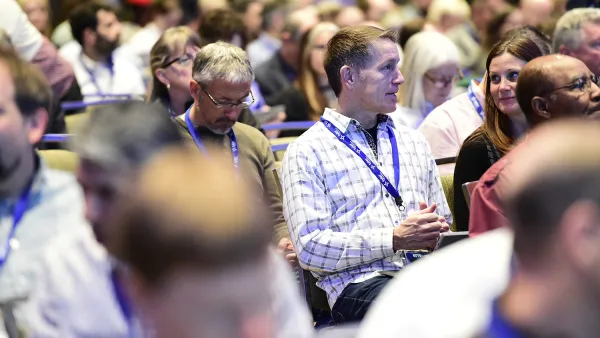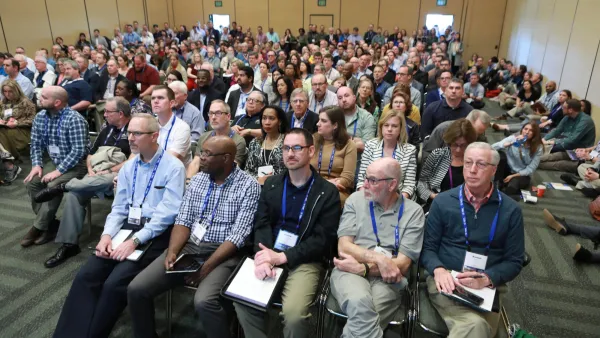After last year's National Planning Conference was canceled in the early days and weeks of the COVID-19 pandemic, the annual event returns online, with tons of planning content and even several avenues for networking and socializing.

The American's Planning Association's 2020 National Planning Conference, scheduled for the end of April in Houston, was canceled on March 17—early on in the stay-at-home orders that would redefine daily life during the pandemic.
The 2021 National Planning Conference, originally scheduled for Boston, will take place this week, May 5-7, in the online format we've become so accustomed to, but with some technological bells and whistles to duplicate some of the usual excitement and activity of the National Planning Conference. There is still plenty of Boston-specific content to peruse under the "Beats of Boston" activity type on the conference program, so the opportunity to explore a new or unfamiliar city—one of the obvious appeals of attending any National Planning Conference—is still available. Several "Bites of Boston" videos are already available online if you're registered for the conference, and the local host committee is clearly trying to make us feel at home in Boston, even from afar (check out the voiceover in the introduction from "your cousin Karla" in Boston who "bets we're wicked bummed" not to be there).
The Beats of Boston content available to watch right now includes, among other videos, a pronunciation guide for local towns, an introduction to a local planner, and insight into a historic institution common in New England—the town meeting (familiar to those of us on the West Coast only from Gilmore Girls reruns). There's plenty Beats of Boston content to peruse now, before the conference starts, and more on-demand content, including an orientation tour of Greater Boston, looks like it will be added once the conference is underway.
Another way I have grounded myself in the conference program is by perusing the conference schedule by "program area"—and instantly recognizing more indelible marks left on the field by the pandemic. I started my event planning by highlighting panels under the "COVID Recovery and Reinvention" program area before moving to "Addressing a Legacy of Inequality" and finishing up with "Resilient Planning in a Changing Climate." It's obvious to me that all these program areas are intersectional—even if one of these crises is more likely to subside on a short-term timeline than the others, the lessons from each should contribute to the others. The intersectionality of these subjects probably wasn't lost on the conference organizers either, as many of the panels could have been scheduled under any of these program areas. With additions from just those three program areas, my schedule for the first two days of the conference is already full, and frequently double booked.
Of course, much of the excitement and value of a typical National Planning Conference happens outside of panels, in the networking opportunities available in the conference halls, off campus at bars and restaurants, and in serendipitous encounters on the streets between the convention center and the convention hotel. To duplicate some of the usual experience of interacting with thousands of planners from all over the country, the APA will provide career counseling through the conference career center, including resume clinics and career-specific panels and events, as well as digital networking opportunities in the "NPC21 Connect" virtual environment. In addition to providing a virtual environment for one-on-one interactions, causal networking, and games, NC21 Connect will also offer topic-based discussions, APA office hours, division gatherings, and more.
As always, the conference will also live on social media. The hashtag #NPC21 is already getting action on Twitter, with reading that will also help you make the most out of this pandemic version of the annual National Planning Conference.

National Parks Layoffs Will Cause Communities to Lose Billions
Thousands of essential park workers were laid off this week, just before the busy spring break season.

Retro-silient?: America’s First “Eco-burb,” The Woodlands Turns 50
A master-planned community north of Houston offers lessons on green infrastructure and resilient design, but falls short of its founder’s lofty affordability and walkability goals.

Delivering for America Plan Will Downgrade Mail Service in at Least 49.5 Percent of Zip Codes
Republican and Democrat lawmakers criticize the plan for its disproportionate negative impact on rural communities.

Test News Post 1
This is a summary

Test News Headline 46
Test for the image on the front page.

Balancing Bombs and Butterflies: How the National Guard Protects a Rare Species
The National Guard at Fort Indiantown Gap uses GIS technology and land management strategies to balance military training with conservation efforts, ensuring the survival of the rare eastern regal fritillary butterfly.
Urban Design for Planners 1: Software Tools
This six-course series explores essential urban design concepts using open source software and equips planners with the tools they need to participate fully in the urban design process.
Planning for Universal Design
Learn the tools for implementing Universal Design in planning regulations.
EMC Planning Group, Inc.
Planetizen
Planetizen
Mpact (formerly Rail~Volution)
Great Falls Development Authority, Inc.
HUDs Office of Policy Development and Research
NYU Wagner Graduate School of Public Service






























